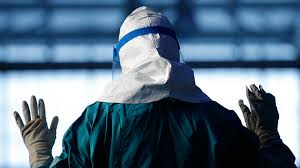
One of the world’s leading medical journals is blasting the decision of some states to quarantine ]Ebola health workers returning from West Africa.
In an editorial published Monday, the usually staid New England Journal of Medicine describes the quarantines as unfair, unwise and “more destructive than beneficial.” In their words, “We think the governors have it wrong.”
“We understand their motivation for this policy — to protect the citizens of their states from contracting this often-fatal illness. This approach, however, is not scientifically based, is unfair and unwise, and will impede essential efforts to stop these awful outbreaks of Ebola disease at their source, which is the only satisfactory goal,” the editorial says. “The governors’ action is like driving a carpet tack with a sledgehammer: it gets the job done but overall is more destructive than beneficial.”
The editors say the policy could undermine efforts to contain the international outbreak by discouraging American medical professionals from volunteering in West Africa.
“The way we are going to control this epidemic is with source control and that’s going to happen in West Africa, we hope. In order to do that we need people on the ground in West Africa,” Dr. Jeffrey Drazen, editor-in-chief of the journal, told NPR’s Goats and Soda. He says it doesn’t make any sense to “imprison” healthcare workers for three weeks after they’ve been treating Ebola patients.
The editorial explains his rationale, arguing that healthcare workers who monitor their own temperatures daily would be able to detect the onset of Ebola before they become contagious and thus before they pose any public health threat to their home communities:
The sensitive blood polymerase-chain-reaction (PCR) test for Ebola is often negative on the day when fever or other symptoms begin and only becomes reliably positive 2 to 3 days after symptom onset.
This point is supported by the fact that of the nurses caring for Thomas Eric Duncan, the man who died from Ebola virus disease in Texas in October, only those who cared for him at the end of his life, when the number of virions he was shedding was likely to be very high, became infected. Notably, Duncan’s family members who were living in the same household for days as he was at the start of his illness did not become infected.
Federal guidelines from the Centers for Disease Control and Prevention call for high-risk health workers — defined as those who have had a known direct exposure to the virus as a result of a needle stick or a breach in their protective suits — to be isolated and to avoid public transportation, but they do not call for mandatory quarantines. Several states, however, are going further and imposing quarantines on any healthcare worker who treated Ebola patients in Guinea, Liberia or Sierra Leone, regardless of their exposure or risk status.
New Jersey health officials held Kaci Hickox, a nurse with Doctors Without Borders, all weekend in an isolation tent adjacent to the Newark University Hospital. She’d just returned from Sierra Leone where she’d been treating people with Ebola.
Despite testing negative for Ebola and having no known direct exposure (as described by the CDC), she was detained by New Jersey officials. She’s now being sent back to her home state of Maine. Officials there say she’ll be under a mandatory home quarantine for 21 days after her last possible exposure to the virus. Twenty-one days is the outer limit of the incubation period of Ebola.
Meanwhile, New Jersey governor Chris Christie stands by his state’s quarantine policy and the treatment of Hickox, despite intense criticism from top health officials around the world. Yesterday, the head of the United Nations Ebola response team warned against making decisions about quarantines based “hype and hysteria,” saying these policies should instead be grounded in scientific evidence and medical expertise.
“Anything that will dissuade foreign trained personnel from coming here to West Africa and joining us on the frontline to fight the fight would be very, very unfortunate,” Anthony Banbury, head of the U.N. Ebola Emergency Response Mission, told Reuters.
Leading U.S. health authorities have also condemned these policies, saying they are not based on good science and, paradoxically, could ultimately threaten public health in the United States by making it harder for needed personnel to go to West Africa to help contain the outbreak, which has killed nearly 5,000 people and infected more than 10,000 across Liberia, Guinea and Sierra Leone, with isolated cases reaching Spain, the United States, and three neighboring African countries (Nigeria, Senegal, and Mali).
